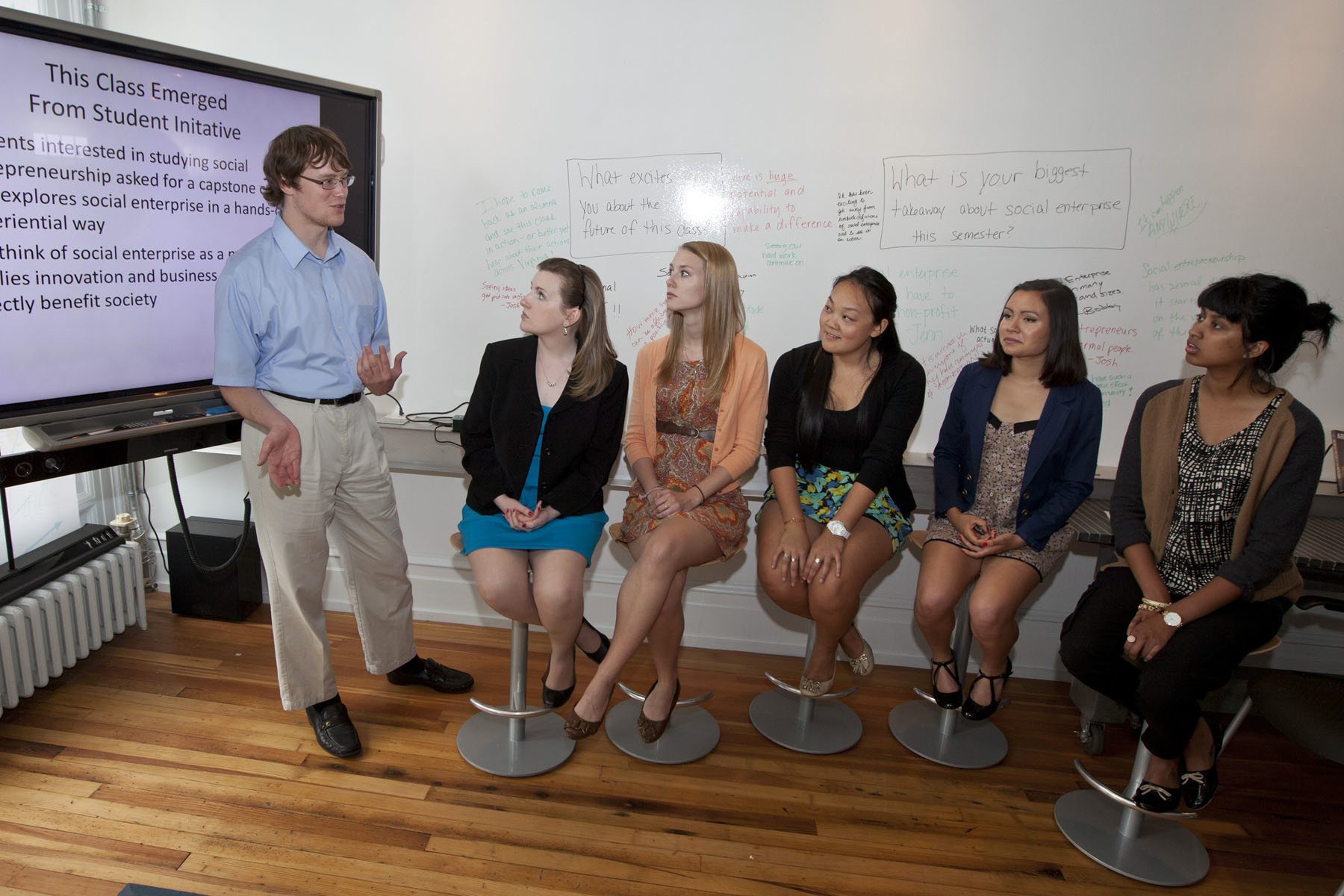May 1, 2012 — What could happen if Charlottesville's at-risk youth grew up dreaming of starting their own businesses, instead of being the next Kobe Bryant or Jay Z?
Fostering entrepreneurial dreamers might be the most promising answer to the challenge of creating job opportunities for the city's low-income families, according to a University of Virginia course that spent the semester engaging with local poverty issues and visiting innovative social enterprises across the mid-Atlantic – like a gourmet bakery that employs ex-convicts and a soup kitchen that runs a profitable catering business, creating jobs for the formerly homeless.
The course, "Field Work in Social Enterprise: Reducing Poverty in Charlottesville," aimed to get students "out of the U.Va. bubble," immerse them in local issues of poverty, study successful social enterprises in other cities and apply the lessons learned by proposing specific ideas to catalyze social enterprise in Charlottesville, explained course instructor Lauren Purnell, a doctoral candidate in business ethics at the Darden School of Business.
Purnell co-taught the class with Charlottesville City Councilor Dave Norris, director of the new Charlottesville Institute, whose goal to connect the Charlottesville community with U.Va.'s intellectual, academic and creative resources. The class was sponsored by the Department of Psychology in the College of Arts & Sciences and Darden's Institute for Business in Society.
The course began by studying the Orange Dot Project's 2011 report on the extent of poverty in Charlottesville, Purnell explained last week as she introduced the students' final presentations at U.Va.'s new OpenGrounds Studio on the Corner. The report found that one in five families in Charlottesville does not make enough money to live on its own, while one in three can't afford child care and transportation. In aggregate, those families need $20 million to $30 million in additional total income to close this "income deficit" and become financially independent.
"The income deficit is not something that can be solved by creating a few more minimum-wage jobs or founding another nonprofit," said Mallory Combemale, a second-year student in the College of Arts & Sciences who plans to double major in global development studies and East Asian studies. "It requires transformational change and leadership from all parts of the community."
Combemale and other students came to that conclusion only after they had left the classroom to engage with Charlottesville's low-income community, and those who work with it, making 10 local site visits. They spent an evening working at the PACEM homeless shelter. They visited the Westhaven public housing site, and heard a national perspective on public housing challenges from guest speaker John Trasvina, assistant secretary for fair housing and equal opportunity at the U.S. Department of Housing and Urban Development. At the Crescent Hills Clinic, former City Councilor Holly Edwards discussed her work there as a public health nurse. The students also visited the Virginia Initiative for Employment not Welfare and the Monticello Area Community Action Agency.
The students heard from more than 20 people engaged with the low-income community, including Eddie Harris, who created the REAL Dads support group for fathers, including former felons and single parents. Darden professor Greg Fairchild, director of the Tayloe Murphy Center, shared his expertise on community-development financial institutions that serve low-income customers.
The 25 students, divided into four groups, then headed out of town to visit innovative social enterprises in Washington, Richmond and Yonkers, N.Y., looking for lessons and models that could be applied in Charlottesville.
Greyston Bakery in Yonkers makes gourmet brownies, including those that go into Ben and Jerry's ice cream. The bakery employs about 65 people and has a hiring policy that welcomes the "hard-to-employ," including former felons and those without a high school diploma, providing them job training and supportive services. Bakery profits support the Greyston Foundation's community development initiatives, including low-income housing, child care and health services.
The D.C. Central Kitchen, the country's oldest community kitchen providing meals for the poor and homeless, provides about 5,000 meals a day to area schools, homeless shelters and halfway houses. About half the staff are former felons, addicts or one-time homeless people who completed the group's job training program. They now have food industry skills and many work for the kitchen's profitable Fresh Start catering business, earning a decent wage with full benefits.
Combining lessons from both the Greystone Bakery and the D.C. Central Kitchen, the students proposed that The Haven day shelter in Charlottesville leverage its large industrial kitchen to offer a food preparation classes for the hard-to-employ, and, eventually, create a local catering business employing those who complete the course. This would build on the local "Ready, Set, Cook!" prep cook training program that welcomes the hard-to-employ.
More generally, Charlottesville should foster entrepreneurs among the low-income community because entrepreneurship tends to build wealth, which is the key to breaking the cycle of intergenerational poverty, said Paola Castillo, a third-year student in the McIntire School of Commerce. According to a study she cited, on average, households with a self-employed entrepreneur earn about 20 percent more income and have three times as much wealth as households without a self-employed person.
To build the pipeline of local entrepreneurs, the community should create a business mentorship program for low-income youth. This could also create a "trickle up" learning effect, as children share with their parents what they have learned about entrepreneurship, business and financial planning, Castillo said.
Students posted their research, conclusions and proposals in a class blog, so the next iteration of this class can build on that work and tackle a new aspect of catalyzing local social enterprise, Purnell said. For instance, the next class might study the feasibility of creating a youth business mentoring program by harnessing existing community groups.
"This is just the beginning," Purnell said.
– by Brevy Cannon
# #
Media Contact
Article Information
May 1, 2012
/content/entrepreneurial-dreams-can-beat-local-poverty-uva-class-proposes

